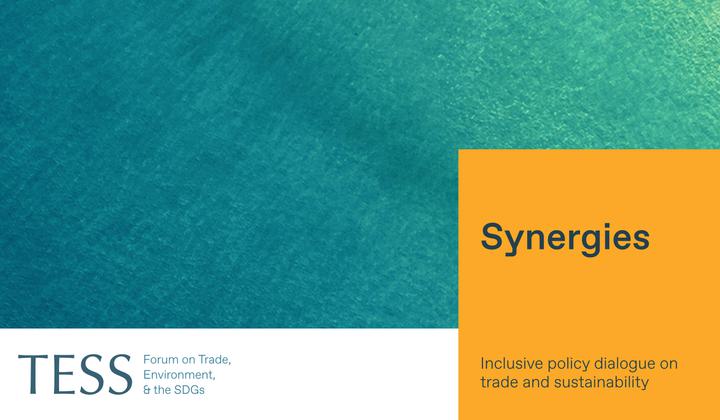Although not on the formal agenda at COP26, rising climate and trade tensions cannot be ignored. A coalition approach could be the answer.
Tackling the intersection of trade and climate policies is central to achieving the goals of the Paris Agreement, but ensuring that growing trade tensions do not thwart progress urgently requires dialogue and international cooperation at the highest political level.
Trade issues are directly relevant to climate action in many ways. Achieving the Paris climate goals requires a significant change in the organization of global value chains and in the composition and geography of trade flows.
As no country’s economy operates in isolation, domestic efforts to decarbonize and implement climate policies to achieve net zero commitments also inevitably affect trade. In the absence of a global carbon pricing system, for instance, domestic carbon pricing policies raise competitiveness and carbon leakage concerns, prompting calls for border carbon adjustments.
At the receiving end of a growing array of trade-related climate policies, developing countries worry these will hamper their trade and sustainable development prospects, and caution against the risk of disguised protectionism. Meanwhile, extreme weather events and shifting climatic conditions hit the poorest and most vulnerable countries hardest, hurt tradeable sectors which are key to many countries, and pose risks to the resilience of international supply chains.
Trade Has a Critical Climate Role
Trade has to be part of the climate solution. It plays a critical role in enabling countries to access critical goods, such as food supplies, that they can no longer produce due to climate-induced changes in production patterns. Trade is also essential to scaling up the diffusion and uptake of renewable energy and climate-smart goods, services, and technologies.
Around the world, businesses do recognize the need to change and are calling for predictable and transparent climate and trade policy frameworks to incentivize decarbonization and support the shift to more sustainable production.
Strengthened international consultation and cooperation is vital to avoiding trade conflicts and unnecessary barriers to trade, ensuring trade policies and rules are not an obstacle to climate action, tackling trade flows that undermine progress on climate goals, and harnessing trade and trade policies as drivers of economic transformation and the just transition required in confronting the climate crisis.
But at the international level, there is no official ‘climate and trade’ agenda at either the World Trade Organization (WTO) or the United Nations Framework Convention on Climate Change (UNFCCC). Although the launch of Trade and Environmental Sustainability Structured Discussions (TESSD) at the WTO does offer the potential for much-needed multilateral dialogue on climate and trade, there is still no clear anchor for ministerial-level diplomacy and coordination on climate–trade intersections across the full range of relevant international processes.
This gap allows uncertainty, mistrust, and trade tensions to fester and for climate and trade policymaking to advance in silos, dispersed across a constellation of international organizations and processes, with limited coordination among them, and using disjointed plurilateral, regional, and bilateral efforts, which spur concerns about transparency and effectiveness.
In the finance arena, the Coalition of Finance Ministers for Climate Action was established in recognition of the value of top-level engagement and cooperation. Drawing on this example, a Trade Ministers’ Coalition for Cooperation on Climate Action could strengthen international dialogue and coordination on strategies, options, and best practices for aligning climate and trade policies.
A coalition would provide a much-needed focal point for constructive efforts to ensure trade and trade policy work for climate mitigation and adaptation. It would provide a vehicle for cooperation to ensure climate actions do not unnecessarily harm trade, unfairly burden developing countries, or exacerbate trade tensions.
First, it could help forge a shared vision of the highest priorities at the interface of climate and trade, how these should be pursued in policy terms, and how best to cooperate and connect the dots between different international processes.
Second, it could serve as a focal point for top level dialogue needed to solve tough and complex issues around competitiveness, fairness, transparency and coordination on trade and climate policy intersections.
Third, it could offer a broader set of countries a seat at the table on climate-trade agenda-setting than is possible through existing processes.
Inclusive Approach With a Diversity of Countries
Ideally, the coalition would engage 40 trade ministers, including G20 members which are the main contributors to global greenhouse gas emissions as well as a diversity of countries of different levels of development from all regions.
This approach would enable the much-needed involvement of countries most vulnerable to impacts of the climate crisis, alongside those particularly impacted by trade-related action on climate and those championing efforts to align trade with climate goals.
It would also strengthen the prospect that climate-trade intersections are pursued in sync with the UNFCCC principle of ‘common but differentiated responsibilities and respective capabilities’, and it would ensure that the critical focus on rapid decarbonization is coupled with a just transition.
Ministers could agree to meet quarterly, convened by two or three ministers as co-chairs, with organizational and analytical support from their respective governments and interested international organizations. Key immediate topics for their attention include:
- how to accelerate the shift away from carbon-intensive trade
- how to promote trade in environmental goods and services that support climate mitigation and adaptation
- how to coordinate diverse regulatory approaches to climate action and manage their trade implications
- how to cooperate on climate-related standards for international trade
- how to support trade-related climate adaptation and supply chain resilience in the face of climate shocks
- how to align forest, agriculture and commodities trade with climate and nature goals.
-----
Carolyn Deere Birkbeck is Director, Forum on Trade, Environment, & the SDGs (TESS)
This piece is an updated version of an article first published on 8 October 2021 by Chatham House.
-----
Synergies by TESS is a blog dedicated to promoting inclusive policy dialogue at the intersection of trade, environment, and sustainable development, drawing on perspectives from a range of experts from around the globe. The editor is Fabrice Lehmann.
Disclaimer
Any views and opinions expressed on Synergies are those of the author(s) and do not necessarily reflect those of TESS or any of its partner organizations or funders.
License
All of the content on Synergies is licensed under a Creative Commons Attribution-NonCommercial-ShareAlike 4.0 International (CC BY-NC-SA 4.0)
license. This means you are welcome to adapt, copy, and share it on
your platforms with attribution to the source and author(s), but not for
commercial purposes. You must also share it under the same CC BY-NC-SA
4.0 license.
If you would like to reuse any material published here or if you have any other question related to Synergies, send an email to fabrice.lehmann@graduateinstitute.ch.




